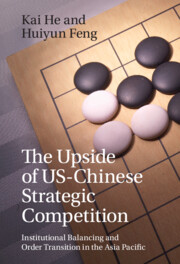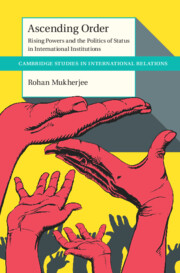Refine search
Actions for selected content:
16 results
4 - The History of the Long Cycle
-
- Book:
- Broken Cycle
- Published online:
- 20 February 2026
- Print publication:
- 19 February 2026, pp 119-180
-
- Chapter
- Export citation
Great power dynamics and international economic cooperation: Experimental evidence from parallel surveys in China and the United States
-
- Journal:
- European Journal of Political Research / Volume 64 / Issue 3 / August 2025
- Published online by Cambridge University Press:
- 02 January 2026, pp. 1189-1207
-
- Article
- Export citation
The Institutional Dynamics of Global Governance in Hard Times: Innovation or Decline?
-
- Journal:
- Ethics & International Affairs / Volume 39 / Issue 2 / Summer 2025
- Published online by Cambridge University Press:
- 22 August 2025, pp. 114-129
-
- Article
-
- You have access
- Open access
- HTML
- Export citation

The Upside of US-Chinese Strategic Competition
- Institutional Balancing and Order Transition in the Asia Pacific
-
- Published online:
- 25 June 2025
- Print publication:
- 05 June 2025
1 - Strategic Opportunity and China’s Foreign Policy
-
- Book:
- China's Strategic Opportunity
- Published online:
- 28 July 2022
- Print publication:
- 11 August 2022, pp 1-27
-
- Chapter
- Export citation
8 - Conclusion
-
- Book:
- Ascending Order
- Published online:
- 21 July 2022
- Print publication:
- 04 August 2022, pp 281-299
-
- Chapter
- Export citation

Ascending Order
- Rising Powers and the Politics of Status in International Institutions
-
- Published online:
- 21 July 2022
- Print publication:
- 04 August 2022
6 - Rise and Fall of Eastern World Orders
- from Part II - Lessons of History
-
- Book:
- Before the West
- Published online:
- 24 February 2022
- Print publication:
- 03 March 2022, pp 217-243
-
- Chapter
- Export citation
With Frenemies Like These: Rising Power Voting Behavior in the UN General Assembly
-
- Journal:
- British Journal of Political Science / Volume 52 / Issue 1 / January 2022
- Published online by Cambridge University Press:
- 08 February 2021, pp. 381-398
-
- Article
- Export citation

Clash of Powers
- US-China Rivalry in Global Trade Governance
-
- Published online:
- 21 January 2021
- Print publication:
- 22 October 2020
The Brandt Line after forty years: The more North–South relations change, the more they stay the same?
-
- Journal:
- Review of International Studies / Volume 47 / Issue 1 / January 2021
- Published online by Cambridge University Press:
- 16 November 2020, pp. 85-106
- Print publication:
- January 2021
-
- Article
-
- You have access
- Open access
- HTML
- Export citation
13 - The Sino-Japanese War, 1894–1895
- from Part III - Contact: East and West
-
-
- Book:
- East Asia in the World
- Published online:
- 08 October 2020
- Print publication:
- 29 October 2020, pp 224-238
-
- Chapter
- Export citation
1 - The Doha Round Impasse
-
- Book:
- Clash of Powers
- Published online:
- 21 January 2021
- Print publication:
- 22 October 2020, pp 30-59
-
- Chapter
- Export citation
Conclusion
-
- Book:
- Clash of Powers
- Published online:
- 21 January 2021
- Print publication:
- 22 October 2020, pp 191-202
-
- Chapter
- Export citation
Introduction
-
- Book:
- Clash of Powers
- Published online:
- 21 January 2021
- Print publication:
- 22 October 2020, pp 1-29
-
- Chapter
- Export citation
Trading privileges for support: the strategic co-optation of emerging powers into international institutions
-
- Journal:
- International Theory / Volume 11 / Issue 3 / November 2019
- Published online by Cambridge University Press:
- 08 October 2019, pp. 318-343
-
- Article
-
- You have access
- Open access
- HTML
- Export citation
